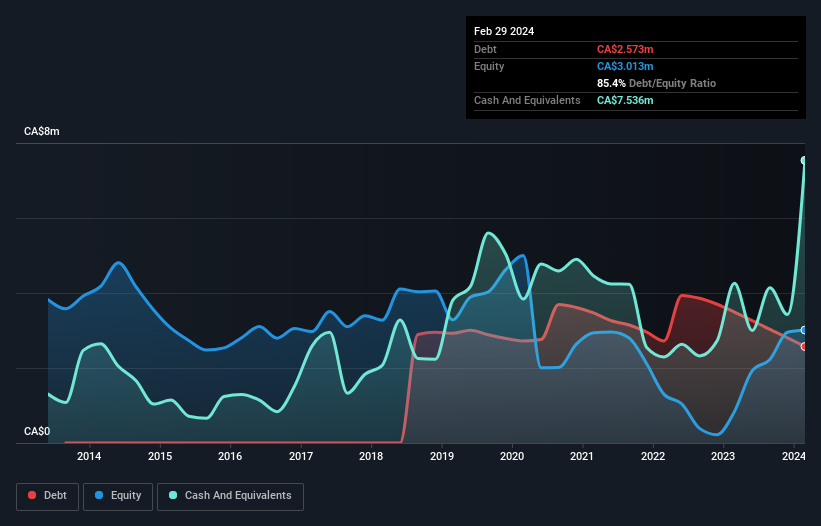Thermal Energy International (CVE:TMG) Has A Pretty Healthy Balance Sheet

The external fund manager backed by Berkshire Hathaway's Charlie Munger, Li Lu, makes no bones about it when he says 'The biggest investment risk is not the volatility of prices, but whether you will suffer a permanent loss of capital.' When we think about how risky a company is, we always like to look at its use of debt, since debt overload can lead to ruin. We can see that Thermal Energy International Inc. (CVE:TMG) does use debt in its business. But the more important question is: how much risk is that debt creating?
What Risk Does Debt Bring?
Debt is a tool to help businesses grow, but if a business is incapable of paying off its lenders, then it exists at their mercy. If things get really bad, the lenders can take control of the business. However, a more usual (but still expensive) situation is where a company must dilute shareholders at a cheap share price simply to get debt under control. Of course, plenty of companies use debt to fund growth, without any negative consequences. The first step when considering a company's debt levels is to consider its cash and debt together.
Check out our latest analysis for Thermal Energy International
What Is Thermal Energy International's Debt?
As you can see below, Thermal Energy International had CA$2.57m of debt at February 2024, down from CA$3.49m a year prior. However, it does have CA$7.54m in cash offsetting this, leading to net cash of CA$4.96m.

A Look At Thermal Energy International's Liabilities
The latest balance sheet data shows that Thermal Energy International had liabilities of CA$11.0m due within a year, and liabilities of CA$3.02m falling due after that. Offsetting these obligations, it had cash of CA$7.54m as well as receivables valued at CA$4.59m due within 12 months. So its liabilities total CA$1.91m more than the combination of its cash and short-term receivables.
Given Thermal Energy International has a market capitalization of CA$43.2m, it's hard to believe these liabilities pose much threat. However, we do think it is worth keeping an eye on its balance sheet strength, as it may change over time. While it does have liabilities worth noting, Thermal Energy International also has more cash than debt, so we're pretty confident it can manage its debt safely.
We also note that Thermal Energy International improved its EBIT from a last year's loss to a positive CA$2.1m. When analysing debt levels, the balance sheet is the obvious place to start. But ultimately the future profitability of the business will decide if Thermal Energy International can strengthen its balance sheet over time. So if you're focused on the future you can check out this free report showing analyst profit forecasts.
Finally, while the tax-man may adore accounting profits, lenders only accept cold hard cash. While Thermal Energy International has net cash on its balance sheet, it's still worth taking a look at its ability to convert earnings before interest and tax (EBIT) to free cash flow, to help us understand how quickly it is building (or eroding) that cash balance. Happily for any shareholders, Thermal Energy International actually produced more free cash flow than EBIT over the last year. There's nothing better than incoming cash when it comes to staying in your lenders' good graces.
Summing Up
We could understand if investors are concerned about Thermal Energy International's liabilities, but we can be reassured by the fact it has has net cash of CA$4.96m. The cherry on top was that in converted 203% of that EBIT to free cash flow, bringing in CA$4.4m. So is Thermal Energy International's debt a risk? It doesn't seem so to us. When analysing debt levels, the balance sheet is the obvious place to start. But ultimately, every company can contain risks that exist outside of the balance sheet. Be aware that Thermal Energy International is showing 3 warning signs in our investment analysis , you should know about...
If, after all that, you're more interested in a fast growing company with a rock-solid balance sheet, then check out our list of net cash growth stocks without delay.
If you're looking to trade Thermal Energy International, open an account with the lowest-cost platform trusted by professionals, Interactive Brokers.
With clients in over 200 countries and territories, and access to 160 markets, IBKR lets you trade stocks, options, futures, forex, bonds and funds from a single integrated account.
Enjoy no hidden fees, no account minimums, and FX conversion rates as low as 0.03%, far better than what most brokers offer.
Sponsored ContentValuation is complex, but we're here to simplify it.
Discover if Thermal Energy International might be undervalued or overvalued with our detailed analysis, featuring fair value estimates, potential risks, dividends, insider trades, and its financial condition.
Access Free AnalysisHave feedback on this article? Concerned about the content? Get in touch with us directly. Alternatively, email editorial-team (at) simplywallst.com.
This article by Simply Wall St is general in nature. We provide commentary based on historical data and analyst forecasts only using an unbiased methodology and our articles are not intended to be financial advice. It does not constitute a recommendation to buy or sell any stock, and does not take account of your objectives, or your financial situation. We aim to bring you long-term focused analysis driven by fundamental data. Note that our analysis may not factor in the latest price-sensitive company announcements or qualitative material. Simply Wall St has no position in any stocks mentioned.
About TSXV:TMG
Thermal Energy International
Engages in the development, engineering, and supply of pollution control products, heat recovery systems, and condensate return solutions in North America, Europe, and internationally.
Flawless balance sheet and slightly overvalued.
Market Insights
Community Narratives



